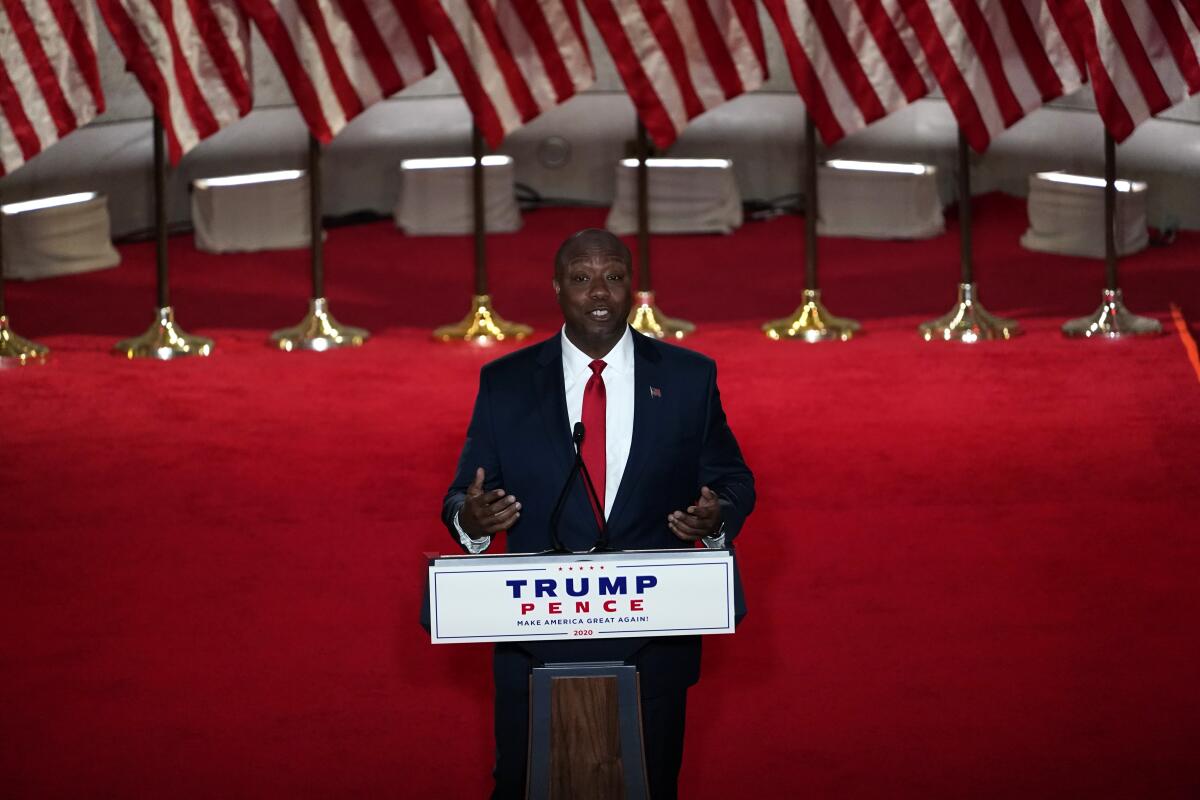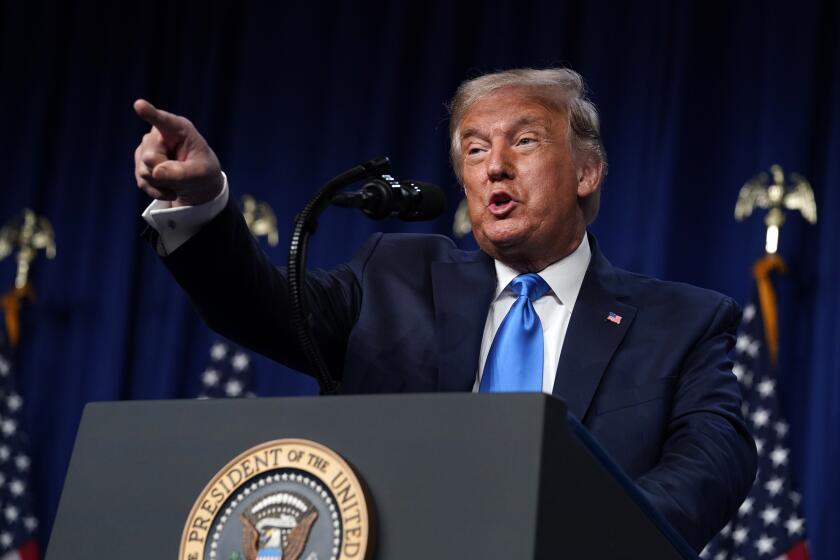Sen. Tim Scott offers his personal story at RNC as counterpoint to Democrats’ agenda

- Share via
Sen. Tim Scott, the highest-ranking Black Republican in Congress, painted Democrats as wanting to radically transform America and offered his personal biography as a counterargument to their agenda in a speech Monday at the Republican National Convention.
The South Carolina senator, giving the capstone address of the evening, portrayed himself as the product of “the promise of the American journey,” an up-by-the-bootstraps story of upward mobility that brought the grandson of a cotton picker to the U.S. Capitol — and warned that Democratic rule could undermine such a trajectory.
“While this election is between Donald Trump and Joe Biden, it is not solely about Donald Trump and Joe Biden,” Scott said. “It’s about the promise of America. It’s about you and me — our challenges and heartbreaks, hopes and dreams.”
Scott’s personal history anchored his remarks. Raised primarily by a single mother and struggling in school, he credited his mother’s encouragement and a businessman mentor for paving his way to success. The heavy tilt toward biography — and prime-time speaking slot — underscored Scott’s ambitions as a national political figure.
His speech, alternately aspirational and lacerating toward the opposing party, mirrors the balancing act that Scott has tried to pull off during President Trump’s tenure. As one of three Black senators and the only Black Republican, he has forged a delicate relationship with Trump, whose rhetoric on race relations can veer into inflammatory or offensive.
Trump was nominated for a second term in a roll-call vote after the four-day Republican National Convention was gaveled into session Monday.
Scott condemned a video of Trump supporters that the president retweeted earlier this summer, in which a man can be heard yelling “white power.” The senator said the clip was “terrible” and should be taken down; the tweet was later deleted, and the White House said Trump did not hear the racist shout.
But the South Carolinian has largely kept his critiques of the president out of the public eye, preferring to raise concerns with Trump privately.
“I think a critique is best in a one-on-one environment. When you don’t like something that has happened, you are better sharing that one on one,” Scott told CNN in June.
When protests exploded this year over racial inequities in the criminal justice system, Scott took the lead in the GOP policing reform measure. His bill — which would have banned chokeholds, prohibited no-knock warrants for federal drug cases and established a national database to track misconduct — failed to advance in June, blocked by Democrats who had their own legislation that proposed more sweeping changes.
Scott, in his speech, lamented the failed effort.
The RNC speaking lineup of Trump’s most vocal defenders and viral right-wing media darlings resembles the president’s favorite conservative prime-time TV shows.
“Democrats called our work a token effort, and walked out of the room during negotiations because they wanted the issue more than they wanted a solution,” Scott said. “Do we want a society that breeds success, or a culture that cancels everything it even slightly disagrees with?”
With race relations especially raw after high-profile deaths of Black Americans such as George Floyd, Scott emphasized racial reconciliation, owing his first win in an overwhelmingly white House district to voters who “judged me not the color of my skin, but on the content of my character.”
Like the speaker who preceded him — former United Nations Ambassador Nikki Haley, who is of Indian descent — Scott emphasized the nation’s progress on race.
“We live in a world that only wants you to believe in the bad news — racially, economically and culturally polarizing news. The truth is, our nation’s arc always bends back towards fairness,” Scott said. “We are not fully where we want to be, but I thank God almighty, we are not where we used to be.”
Scott has focused most of his energies in partnering with the White House on Opportunity Zones, a provision in the 2017 tax cut bill that aims to stimulate investment in high-poverty areas. He trumpeted the program in his remarks as “the first new, major effort to tackle poverty in a generation.” On Monday, before his speech, Scott touted a White House report that said that $75 billion had been committed to such neighborhoods thanks to the program.
Much of his speech aimed to chip away at Black support for Democrats, portraying Joe Biden as an architect of mass incarceration because of his work on the 1994 crime bill and highlighting the former vice president’s myriad malapropisms on race, including his declaration that a Black person who was unsure about supporting him “ain’t Black.” (Biden later apologized.)
More broadly, he depicted Trump’s opponents as seeking “a fundamentally different America” — accusing them of pursuing a “socialist utopia” that would close off opportunities that enabled Scott’s climb.
He closed with a return to his personal history, acknowledging his late grandfather who dropped out of school to pick cotton and never learned to read or write — but lived to see his grandson elected to the U.S. House and Senate.
“Our family went from cotton to Congress in one lifetime,” Scott said. “And that’s why I believe the next American century can be better than the last.”
More to Read
Get the L.A. Times Politics newsletter
Deeply reported insights into legislation, politics and policy from Sacramento, Washington and beyond. In your inbox three times per week.
You may occasionally receive promotional content from the Los Angeles Times.













